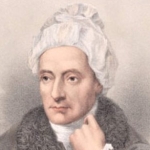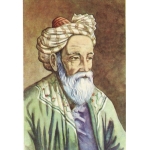(excerpt)
Thou know’st my praise of nature most sincere,
And that my raptures are not conjur’d up
To serve occasions of poetic pomp,
But genuine, and art partner of them all.
How oft upon yon eminence our pace
Has slacken’d to a pause, and we have borne
The ruffling wind, scarce conscious that it blew,
While admiration, feeding at the eye,
And still unsated, dwelt upon the scene.
Thence with what pleasure have we just discern’d
The distant plough slow-moving, and beside
His lab’ring team, that swerv’d not from the track,
The sturdy swain diminish’d to a boy!
Here Ouse, slow winding through a level plain
Of spacious meads with cattle sprinkled o’er,
Conducts the eye along its sinuous course
Delighted. There, fast rooted in his bank,
Stand, never overlook’d, our fav’rite elms,
That screen the herdsman’s solitary hut;
While far beyond, and overthwart the stream
That as with molten glass inlays the vale,
The sloping land recedes into the clouds;
Displaying on its varied side the grace
Of hedge-row beauties numberless, square tow’r,
Tall spire, from which the sound of cheerful bells
Just undulates upon the list’ning ear,
Groves, heaths, and smoking villages remote.
Scenes must be beautiful which daily view’d
Please daily, and whose novelty survives
Long knowledge and the scrutiny of years.
Praise justly due to those that I describe.
. . .
But though true worth and virtue, in the mild
And genial soil of cultivated life
Thrive most, and may perhaps thrive only there,
Yet not in cities oft. In proud and gay
And gain-devoted cities; thither flow,
As to a common and most noisome sewer,
The dregs and fæculence of ev’ry land.
In cities foul example on most minds
Begets its likeness. Rank abundance breeds
In gross and pamper’d cities sloth and lust,
And wantonness and gluttonous excess.
In cities, vice is hidden with most ease,
Or seen with least reproach; and virtue, taught
By frequent lapse, can hope no triumph there
Beyond th’ atchievement of successful flight.
I do confess them nurs’ries of the arts,
In which they flourish most: where, in the beams
Of warm encouragement, and in the eye
Of public note, they reach their perfect size.
Such London is, by taste and wealth proclaim’d
The fairest capital of all the world,
By riot and incontinence the worst.
There, touch’d by Reynolds, a dull blank becomes
A lucid mirror, in which Nature sees
All her reflected features. Bacon there
Gives more than female beauty to a stone,
And Chatham’s eloquence to marble lips.
. . .
god made the country, and man made the town:
What wonder then, that health and virtue, gifts
That can alone make sweet the bitter draught
That life holds out to all, should most abound
And least be threaten’d in the fields and groves?
Possess ye therefore, ye who, borne about
In chariots and sedans, know no fatigue
But that of idleness, and taste no scenes
But such as art contrives, possess ye still
Your element; there only ye can shine,
There only minds like yours can do no harm.
Our groves were planted to console at noon
The pensive wand’rer in their shades. At eve
The moon-beam, sliding softly in between
The sleeping leaves, is all the light they wish,
Birds warbling all the music. We can spare
The splendour of your lamps, they but eclipse
Our softer satellite. Your songs confound
Our more harmonious notes: the thrush departs
Scar’d, and th’ offended nightingale is mute.
There is a public mischief in your mirth,
It plagues your country. Folly such as your’s,
Grac’d with a sword, and worthier of a fan,
Has made, which enemies could ne’er have done,
Our arch of empire, steadfast but for you,
A mutilated structure, soon to fall.



















Comment form: